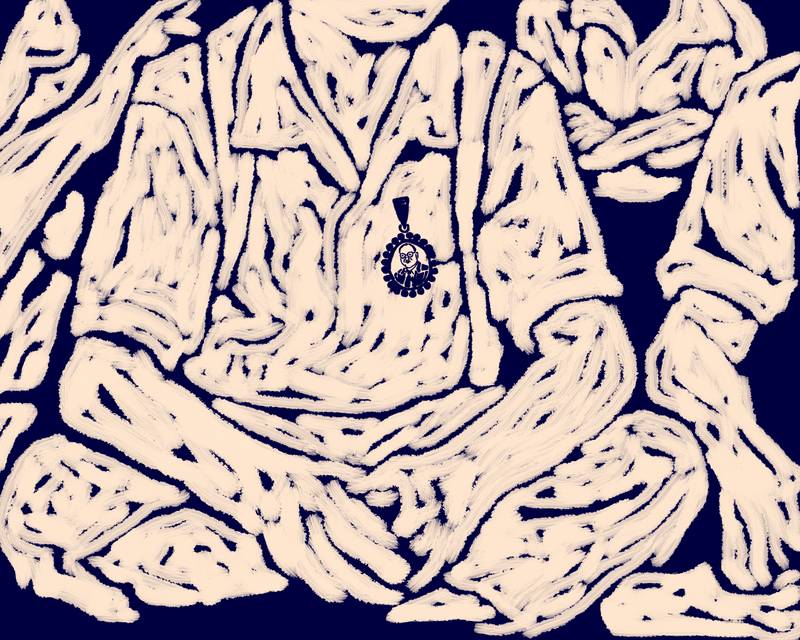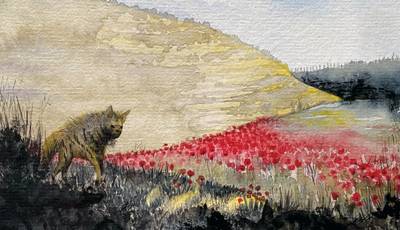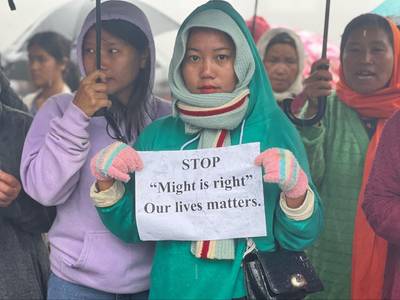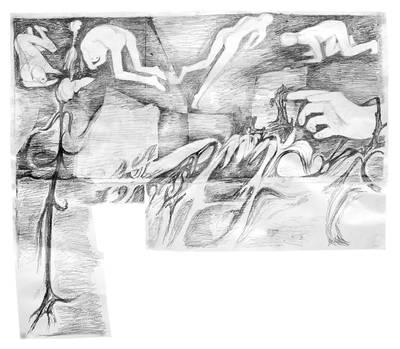

Illustration by Rahee Punyashloka
Pranita Thorat, a Mumbai-based writer, specializes in the intersection of caste and gender in her research and writing endeavours.
Who are we? Why is our history erased? How did we become a construct created by Brahmins? How is education crucial in challenging and dismantling entrenched power structures based on caste? How can we annihilate the oppression of caste and liberate ourselves through education?
Every Dalit student getting an education in India is reclaiming their right to humanity, questioning those in power, and working towards dismantling these power structures. In this process, it is important to archive our experiences, express our views, and engage in an ongoing conversation on education systems as a tool for liberty. In this essay, I delve into my personal experiences, the testimonies of my peers, and our perspectives on the education system, highlighting why we believe it is crucial to discuss the complexities of caste, identity, and liberation within the hallowed halls of education.
Education as a Tool for Dalit Liberation: Babasaheb Ambedkar’s Legacy
Dr. B.R. Ambedkar saw education as a powerful tool for establishing a society grounded in liberty, equality, fraternity, and social justice. He stated, “If the necessity of individual liberty is accepted, it is necessary that each person should be able to protect his freedom and such power, i.e. to protect his freedom, can never be had without education” (Rajhans, 1995, p. 44)1. He emphasised education as an indisposable tool for safeguarding personal freedom, advancing societal progress, and breaking free from social, economic, and political oppression. His tireless advocacy for education went beyond traditional academics; it aimed to instil a broader social consciousness and a deep sense of dignity and self-respect among those who had long been marginalised. For Babasaheb Ambedkar, education transcended its conventional definition as a means of gaining knowledge and livelihood; rather, it served as a potent weapon in the struggle to liberate the oppressed from the shackles of ignorance and to bolster their resistance against injustice, exploitation, oppression, and humiliation. Providing education to the masses was a way to empower them with the ability to think and understand society and humanity. Ambedkar championed legal reforms to ensure equal rights for all citizens. His persistence led to provisions in the Indian Constitution abolishing untouchability, promoting equality, and implementing reservation policies for marginalised communities. Today, our constitution, drafted by Dr. B.R. Ambedkar, who chaired the Constitution Drafting Committee, provides us with safeguards for equal social and political representation through reservation. Yet, these safeguards are often used against us, further dehumanising us.
One of the most pervasive experiences for Dalit students is the constant feeling of being “othered” – treated as outsiders in their own educational spaces. The othering manifests in ways such as being subjected to discriminatory gazes, facing power dynamics that undermine their presence, and encountering barriers to accessing even general information due to language differences and group dynamics.
India stands out as a country where the intellectual class, specifically the Brahmins, not only held a monopoly on education but also labelled the pursuit of knowledge by lower castes as a criminal act. Punishments for such offences included severe measures like cutting off the tongue or pouring molten lead into the ears of the person involved (Moon, 2014, p. 215). Brahminical ideology has historically deprived us of this right to knowledge by creating roadblocks in accessing education – a fundamental tool for reclaiming our humanity. Its roots can be traced back to ancient Hindu scriptures that codified the caste system, such as the Manusmriti. Over centuries, these social practices became deeply ingrained in Indian society. Brahmins perpetuated a system where knowledge and education were monopolised and controlled by them. Their hegemonic control over education ensured its access remained reserved to certain social groups, primarily the upper castes, while systematically marginalising and excluding others, particularly Dalits and women. This deliberate and systemic exclusion has manifested into discriminatory practices in educational institutions, perpetuating a culture of caste-based segregation even in spaces of knowledge.
In 2013, at the age of 15, I took admission into a prestigious higher education institute in Mumbai, moving from the suburban town of Kalyan into the metropolis. My arrival was met with questioning glances from school friends and college peers. Under the surface, it carried a weighty subtext – why, as a Dalit individual, did I dare to step foot into an educational institution? – a direct attack on my sense of self and identity. It was less about the logistics of enrollment and more about challenging my right to be there. The very presence of Dalit students, even in educational spaces, challenges the established order of Brahminical society. To quote James Baldwin, “If trouble don’t last always, as the Preacher tells us, neither does power.” My pursuit of education was perceived as a radical assertion of my humanity that threatened the dominant ideology and power structures.
How We Are Made to Feel
When I first stood in front of the campus gate, I felt incredibly small. The buildings towered over me, and everything seemed new and unfamiliar. The lifestyle of the people in Mumbai and the language they used were vastly different from what I was accustomed to. Navigating such unfamiliar spaces takes time, and like me, for many Dalit students, the journey is filled with challenges. One of the most pervasive experiences for Dalit students is the constant feeling of being “othered” – treated as outsiders in their own educational spaces. The othering manifests in ways such as being subjected to discriminatory gazes, facing power dynamics that undermine their presence, and encountering barriers to accessing even general information due to language differences and group dynamics.
In my conversations with a Dalit student, Avnisha Lalan, they shared their experience of coming to Mumbai from Kutch in 2021 for higher education, “Our college classes started online due to COVID in the first year, so my classmates and teachers knew me through social media and WhatsApp and were friendly. However, when I came here to attend physical classes, I noticed a change in their behaviour. They wouldn’t talk to me much because I didn’t speak Marathi. I was vocal about my caste and sexuality, and that seemed to weird them out, and they maintained distance. It was difficult to comprehend this behaviour, and it didn’t help that the teachers were also casteist. Once, during our foundation course, a professor talked about reservations and said students from reserved categories should not be there. They would continuously question the students’ merit.”
The reservation system, introduced as a means of affirmative action, aims to address historical injustices and provide opportunities for marginalised communities, including Dalits, in educational institutions and public employment. Babasaheb Ambedkar advocated for this system as a mechanism to rectify centuries of caste-based discrimination and ensure social equity. However, the narrative of reservation and merit becomes a weapon used to exclude Dalit students from educational opportunities. We are made to feel as though we have committed a crime by securing a seat in these institutions as if we have infringed upon the “rightful territory” of upper-caste students. The accusation that Dalit students are wrongly or unrightfully claiming opportunities is constant. There is a segregative perception that educational institutions belong to the upper caste and we lack merit, the “appropriate” language, and the right to occupy these spaces. Colleges with a majority of Dalit students often face underfunding. They are not awarded higher NAAC (National Assessment and Accreditation Council)2 rankings, thus being labelled as second-class institutions, which hampers the networking and career prospects of its alumni. These colleges are intentionally neglected, exacerbating disparities in educational opportunities.
The truth is that our presence challenges the status quo, disrupts the narrative of caste-based hierarchy, and threatens the power dynamics that sustain the dominance of the upper castes. Their discomfort leads to acts of cruelty and dehumanisation perpetrated by both students and teachers from dominant communities. They derive a sense of power from making us feel inferior, and they often succeed in taking away our dignity and self-worth. The power dynamics entrenched in these spaces make navigating incredibly difficult for Dalit students. Despite overcoming numerous barriers to reaching higher education, we find ourselves constantly battling against the forces of casteism. The glass ceilings we break are quickly replaced by new barriers by those who seek to maintain their privileged positions.
Education in Contemporary Times
Dalit students face significant obstacles even before reaching higher education institutes. Limited access to resources and financial constraints make it incredibly challenging for them even to finish SSC (Secondary School Certificate) board exams, let alone pursue higher education. Public policies that once aimed to facilitate access to education for marginalised communities are now being overshadowed by the trend towards privatisation, making higher education inaccessible to those who could previously benefit from such policies. While students and their families strive to overcome these barriers, the increasing privatisation of higher education institutions poses another hurdle. The landscape of educational institutions is evolving rapidly, with many becoming increasingly autonomous3. While autonomy in education can bring about positive changes, such as academic innovation and flexibility, it also presents significant challenges.
But why this censorship and gatekeeping? Because when individuals recognize their oppression, they are more likely to challenge it. In classrooms today, there is evident discomfort when Dalit students attempt to speak about caste. It’s more than just discomfort; it’s the notion that the guilt of being the oppressor must not be addressed.
As institutions become more autonomous, they prioritise profit over inclusivity, making it difficult for students from diverse backgrounds to secure admission. This trend effectively gatekeeps individuals from lower socioeconomic backgrounds, leading to more disparities in educational spaces. Moreover, the shift towards privatisation limits the government’s ability to influence the curriculum, resulting in a narrowing of educational content. As a consequence, topics such as caste, gender, economics, and politics receive less emphasis in the syllabus. This capitalization of education not only restricts access for marginalised communities, such as Dalits, but also undermines the broader goals of education in fostering critical thinking, social awareness, and inclusive citizenship. The emphasis has shifted to obtaining degrees rather than fostering critical thinking and social awareness. Classrooms have become spaces where discussions on sensitive topics like caste, gender, religion, and politics are discouraged or outright prohibited. But why this censorship and gatekeeping? Because when individuals recognize their oppression, they are more likely to challenge it. In classrooms today, there is evident discomfort when Dalit students attempt to speak about caste. It’s more than just discomfort; it’s the notion that the guilt of being the oppressor must not be addressed. By leaving these issues unaddressed, the dominant group maintains its power and continues oppression. This suppression of knowledge is a tactic used to establish a country where critical discourse is stifled, allowing power structures to thrive.
Navigating Educational/Social Spaces
Navigating educational spaces presents continuous challenges, not a one-time hurdle. Each step brings its own set of obstacles, requiring individuals who face these challenges to adapt and counter them. Avnisha recollects their initial days: “Creating my own space was crucial for me. Coming from a [Babasaheb] Ambedkarite family, I found confidence in Babasaheb’s teachings. Finding a community in Mumbai provided a sense of belonging and security. I established myself as an assertive Ambedkarite, unafraid to speak out against injustice.”
Having a community to rely on is essential, as it provides reassurance and solidarity in times of need. This community can mean fellow Dalit students, supportive faculty members, activists, and organisations dedicated to social justice. This community also includes teachers, alumni, and people from the Dalit community in varied fields who generate resources for the students, including funds for their education and the establishment of educational spaces tailored to their needs. Such support structures are informal yet resilient, built on mutual trust, empathy, and shared aspirations for empowerment and liberation.
When on campus, students find themselves in situations where they are forced to figure out how to acclimatize and sustain themselves in the college environment. To adapt to this new environment, they juggle various responsibilities. They need to manage academic requirements, financial constraints, and social pressures. They feel compelled to learn and understand the different languages used on campus to communicate effectively and feel included. Along with these challenges, they must also confront discriminatory attitudes and navigate situations where their admission through reservation is questioned, requiring them to assert themselves and persevere in the face of adversity. In these moments, students engage in discovering their realities and understanding society’s functioning by starting to read about caste, question why we are treated differently and engage in discussions about caste society.
I was also at a stage where I was fighting because I viewed myself the same way people viewed me. I thought of myself as less, undeserving and meritless. The question, “Why is this happening to me?” puts us in a position where we must decipher the reasons.
When individuals are consciously aware of who they are, nobody can tell them they are less. Having a community to rely on is essential, as it provides reassurance and solidarity in times of need. This community can mean fellow Dalit students, supportive faculty members, activists, and organisations dedicated to social justice. This community also includes teachers, alumni, and people from the Dalit community in varied fields who generate resources for the students, including funds for their education and the establishment of educational spaces tailored to their needs. Such support structures are informal yet resilient, built on mutual trust, empathy, and shared aspirations for empowerment and liberation. Student communities that revolve around inclusivity, empathy, and collective action provide a safe space where their peers can freely express themselves, seek guidance, and find strength in unity. Through our shared experiences and collaborative efforts, we, as a community, challenge oppressive systems within educational spaces.
Upon securing my admission to the Tata Institute of Social Sciences to pursue a Master’s degree in Social Work in 2021, I underwent a transformative shift due to the readings I delved into, the individuals I met, and the support they offered. This time around, although my anxiety was considerably lower, I was on campus with increased confidence and assertiveness compared to the past. This academic journey felt entirely different from my bachelor’s. I underwent many phases to reach a stage where I felt confident about myself and took the time to figure out my strengths and change my view of myself. Being on the Internet, reading, communicating with people, and socialising helped this process. Over time, I viewed myself not as inferior or superior but simply as a student aspiring to advance in education.
Avnisha shares their experiences of navigating these spaces, “For me, there was no sense of direction to figure out the essential steps just to pursue a bachelor’s degree. No one in my family had any clue about academic fields, as my sibling and I were the first in my household to pursue a higher education degree. Moving from a rural area to a city brimming with opportunities highlighted the abundance of choices available, but it also underscored the lack of guidance within our community. There were so many things I couldn’t do because there was no guidance. Accessing even basic information about new courses, universities, or opportunities was challenging, as knowledge in the corporate realm seemed guarded by specific communities. A few days ago, I was talking to my sister, telling her how very lonely it feels to figure out everything on my own. She said we are first-generation learners, so we have no idea which field to go into. Many first-generation learners like myself lacked educated caregivers to offer basic guidance from the time we entered school. The caregivers were just as clueless as their children, further limiting access to essential information – figuring out these resources required networking and talking to students who have already finished the degree or are from similar fields. Even now, I am very confused about figuring out what to do in my career. Society creates such a sense of helplessness for people from specific communities in academic spaces that they must figure out everything on their own with their limited resources.”
Without the benefit of familial or community experience to draw upon, every decision for first-generation learners—from selecting courses to understanding campus protocols—becomes difficult. In the absence of readily available guidance, students learn to rely on their own resourcefulness, seeking out information, using support networks, and gaining mentorship wherever possible.
Avnisha adds, “But there are people out there; it matters that students talk to students, and then you find the right people who can help you. We have our knowledge and our community. We can share what we know because even today, very few people in our community can access the Internet and proper academic materials. Still, reading is the only way to learn about our reality. Now that many of our students are pursuing higher education, there is the possibility of finding students from our community who are in different fields and can guide us.”
Kshtij (who holds a master’s degree in psychology and has represented young people through various platforms like Tedx Pune, G20 summit 2023, and UNICEF’s South East Asia Conference on topics related to education and mental health) talks about the importance of community in navigating educational spaces where the feeling of otherness can make one feel invisible, hampering emotional, social, and academic growth.
In one of my master’s classes, I was not allowed to speak because I was speaking about caste. In such a situation, belonging to a community based on understanding these shared experiences of being from that community reasserts the basic respect that any individual deserves. Kshitij explains how he found his own ground in these situations – “Even though I was educated in the English medium and used to read and write in English, I never spoke English until the 10th grade. Writing and speaking in English are entirely different experiences shaping confidence in the language. So, the first step in improving my communication was actually communicating and not caring about making mistakes. I started communicating with everyone. The first label we give people is gender by seeing them, the second is communication, and the third is social and financial background. If we disregard these labels, we can meet and talk to people without the fear of judgment. If you are genuinely interested in the person without the label of gender, caste, social background, or language, you will feel a sense of belonging. We can foster our confidence in language by simply communicating in a language with people who speak the same language. We don’t have to see communicating with people as if it is an exam or a hierarchical thing. You start feeling comfortable talking to different groups, adapting to their language, learning, and moving on. I have been with different groups of people from different lifestyles, financial backgrounds, and castes. Looking back, when I was 17 or 18, I used to feel underconfident going to fancy places like hotels and stuff, but after I was 20, I realised I just had to be there. I mean, you went there to have lunch, dinner, and party, not to be seen by others. Young adults in our community often lack interaction with diverse groups, leading to a limited understanding of communication skills and hierarchical dynamics”.
In one of the conversations, Kshitij mentions Babasaheb’s vision of emancipation through education. This vision involves gaining knowledge about oneself, one’s history, and community, leading to the realisation of inherent human worth. Such a holistic approach to education encompasses a comprehensive understanding of life, including various aspects such as life skills, philosophies, cultural dynamics, and societal norms.
Rethinking the purpose of education
The education system today operates on a kind of meritocracy that does not consider generational and systemic disadvantages faced by students from marginalised social and economic backgrounds. The merit of students is evaluated not just on academic performance but also on fluency in English, the use of sophisticated language, and the ability to write in academic language. However, education should extend beyond these superficial markers to attain genuine liberty. True education should encompass a spectrum of experiences and life skills. While formal education remains essential for survival in society, it must not be limited to acquiring degrees. Rather, it should delve into broader topics such as political turmoil and peace-building efforts—essential knowledge for navigating the complexities of the world today. It is about recognizing and respecting the inherent humanity in every individual, irrespective of their background or identity. Promoting education as an unceasing competition strengthens existing hierarchies and worsens societal inequalities. The vision of thinkers like anti-caste educationists and thinkers like Mahatma Jotirao Phule was to cultivate independent thought and critical inquiry. Hence, it is crucial that we reassess and reimagine the purpose of education and prevent it from becoming yet another caste-ridden capitalist structure sustaining existing systems of discrimination. Education should prioritise comprehensive learning, empathy, critical thinking, and social consciousness. Only then can we aspire to dismantle the firmly established systems of discrimination and pave the way for an equitable and inclusive society.
I sincerely thank Avnisha Lalan and Kshitij Kamble for their invaluable contributions to the conversation on caste discourse and education in contemporary times.







